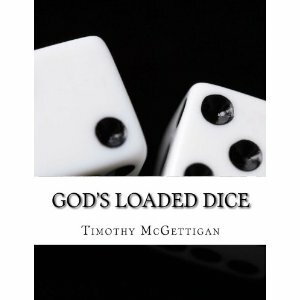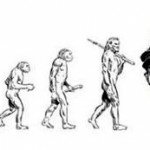 All Entries in the "Timothy McGettigan" Category
All Entries in the "Timothy McGettigan" Category

Racism and Hypocrisy: Celebrating Diversity–Just Not Among Humans
As Darwin pointed out in the The Origin of Species (1859), species often exhibit enormous variation. Darwin was a pigeon breeder and described at length the astounding variation that, with the help of artificial selection, pigeon breeders had succeeded in cultivating in an otherwise humdrum bird species. Similar forces operate on Canis familiaris and, if anything, have [...]

Feynman’s Cosmic Onion
Albert Einstein believed that the universe was created by a rational god; a god who would never presume to play dice with his precious creation. Einstein’s belief in a rational, knowable universe was rooted in a “clockwork” scientific philosophy that comprised the very bedrock of Enlightenment science. This perspective was most famously summed up by [...]

Sapient Apes Ascendant: The Costs and Benefits of Human Agency
If the messages that are embedded in folklore mean anything, then until very recently humans were terrified of the natural environment (Grimm, et. al., 1915). In many cases, the scariest part of folk tales involves foolish individuals–often kids, in order to emphasize the cautionary nature of the tales–who fall prey to one of the many [...]

When You’re Wrong…You’re Right? Stephen Hawking’s Implausible Defense of Determinism
One can hardly broach the subject of free will or human agency without acknowledging the long-standing and unresolved philosophical debate regarding agency vs. determinism (Campbell, et. al., 2004). To provide an illustration of the extent of disagreement over this dualism, determinists, such as Hawking and Mlodinow (2010), have argued that agency and free will are [...]

Evolution at the Speed of Thought
Scholars have referred to Homo sapiens’ game-changing capacity to transform the biological evolutionary process into an intellectual exercise–or what I refer to as super-adaptability–in a variety of ways. Karl Popper distinguishes between biological and cognitive problem solving. In so doing, Popper emphasizes that for most organisms the one and only means of resolving survival problems [...]

Good Science: An Evolutionary Theory of Truth
Thomas Kuhn (1996) argued that scientific revolutions take place when dominant paradigms are dislodged by emergent paradigms. Science undergoes such transitions when established paradigms fail to account for an increasing number of empirical anomalies. Anomalies may be understood as enigmas for which existing knowledge systems lack convincing explanations, e.g., dark energy (Panek, 2011). Kuhn’s perspective [...]

Thanksgiving at Walmart: Strikers Plan a Nationwide Celebration for Black Friday
Ah, Black Friday. It’s typically the biggest shopping day of the year and, for that reason, the happiest date on the calendar for retailers. On Black Friday, retailers who have been languishing in the red can count on raking in a whole lot of black. Profits galore! As usual, Walmart, the world’s largest and most [...]

God’s Loaded Dice: Einstein and the Death of Classical Reality
There is a crucial distinction between explanatory systems that are based upon fate vs. prediction. Both perspectives purport to shed light upon the course of future events, however, fate is based upon a faith in metaphysics whereas prediction is scientific. Determinism represents a branch of metaphysics primarily because determinists claim to know more about the [...]

Elementary My Dear Watson! The Beauty (and Baloney) of Being Right about Everything
Fate is the most potent weapon in a the arsenal of determinists like Stephen Hawking. To contend, as determinists plainly do, that the outcomes of events are pre-determined is essentially the same as saying that the ebbs and flows of history are all dictated by fate. Actors, whether animate or inanimate, have no control over [...]

It’s Alive!! Ray Kurzweil, AI, and Frankentelligence
If real is what you can feel, smell, taste and see, then ‘real’ is simply electrical signals interpreted by your brain. Morpheus in The Matrix. Ray Kurzweil is obsessed with artificial intelligence (AI). Kurzweil has written a series of bestselling books–most recently How to Create a Mind–in which he advances the argument that machine intelligence [...]



 What to know about the nature of money, the value of money, and money's role in our modern economies of exchange, then download The Rocket Scientists' Guide to Money and the Economy and let the truth set you free. [download]
What to know about the nature of money, the value of money, and money's role in our modern economies of exchange, then download The Rocket Scientists' Guide to Money and the Economy and let the truth set you free. [download] Want to really understand the world that you live in? Then take Sociology 287 by Dr. Michael Sosteric, from Canada's premier open university, Athabasca University. One on one tutor support and one of the best sociology courses ever guarantee you an empowering and enlightening experience. Learn for personal growth, do a degree with AU, or transfer credit to your home institution. Textbooks included in the price of the course.
Want to really understand the world that you live in? Then take Sociology 287 by Dr. Michael Sosteric, from Canada's premier open university, Athabasca University. One on one tutor support and one of the best sociology courses ever guarantee you an empowering and enlightening experience. Learn for personal growth, do a degree with AU, or transfer credit to your home institution. Textbooks included in the price of the course.

